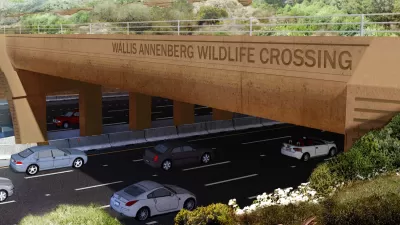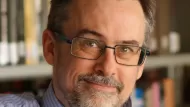The new film The World's End may be a hilarious British comedy about an epic pub crawl interrupted by the Apocalypse, but it also presents the viewer with a provocative perspective on competing views of liberty.
(Warning: Film essay - contains spoilers).
Five friends on the verge of middle age return to their hometown in an attempt to relive their legendary youthful pub crawl, but instead end up battling the evil machinations of alien robots.
And high modernist, centralized planning.
That last bit may not have featured in any of the reviews of this popular film, but in between the beer, blokes and 'bots The World’s End offers a provocative allegory on the nature of freedom, and the wisdom of externally-planned efforts to improve human behavior.
As well, the fact that the film was shot in Letchworth and Welwyn Garden Cities is more than interesting film trivia: Ebenezer Howard's famous planned New Towns provide the physical basis for the film's arguments on authoritarianism and liberalism.
The third in the so-called ''Blood and Ice Cream Trilogy" (following Shaun of the Dead [2004] and Hot Fuzz, [2007] both starring Simon Pegg and Nick Frost) The World's End revisits some of the previous films' tropes, most significantly the not-everything-in-this-English-town-is-as-it-appears-to-be, and a fondness for action scenes set in pubs. Shaun faced off against zombies; Fuzz (also partially filmed in Welwyn) pitted the duo against a criminal conspiracy; and at the World's End pub, Pegg and Frost confront a well-intentioned but murderous alien project in global social engineering.
On the surface, the film appears to be a wacky (if violent) meditation on facing middle age. Terminally adolescent Gary King (Pegg) has never learned to be a responsible adult, symbolized by his car, the same one he owned as a teen, with a 20-year old tape still in the cassette player. While his friends have gone on to have careers, girlfriends, wives and families, Gary's goal in life is redressing his disappointment at having fallen short of completing, at age 17, the famous "Golden Mile" of 12 pubs in their hometown of Newton Haven. His philosophy in life is taken from the lyrics of Primal Scream's song "Loaded”: "We want to be free, we want to get loaded, we want to have a good time."
When Gary shows up to convince his mates -- after years apart -- to return to for a weekend to once attempt the epic pub crawl, his friends (particularly Alan Knightly, played by Nick Frost) can tell at once how messed up he is. Alan in particular still holds a grudge against his onetime best friend. Gary’s singleness of (aimless) purpose is implacable: even when the lads discover that most of the people in Newton Haven have been replaced by robots (or "blanks"), Gary insists on completing their ale-soaked mission.
After a series of well-choreographed fight sequences (that belie how inebriated the characters ought to be!), Gary, Alan and Steven Prince (Paddy Considine) finally reach Word's End, only to find it is the aliens' base of operations. There, an alien robot In the guise of their former schoolteacher, (played by Pierce Brosnan) as well as a disembodied voice of the alien leader (Bill Nighy) seek to educate them of the benevolence of the aliens' intentions: Through their centrally-planned and globally networked efforts, the aliens will help humanity successfully overcome their present, violent and selfish adolescence and integrate with the galactic community as a civilized species.
Throughout the film, urban planning and the built environment generally are used as metaphors for the tensions between behavioral control and the desire for freedom. Several of their fondly-recalled pubs have been homogenized, Starbucks style, right down to their identical menu blackboards; a soulless modern art statue in the town center comes threateningly to life to pursue them; and Newton Haven's roundabouts only serve to disorient, but in the film's climax are disregarded and driven straight through in a bid to escape a rapidly-expanding explosion. The name Newton Haven is, of course, thinly disguised for "New Town”; and its motto -- emblazened on banners that evoke a Nuremberg rally -- reads "We build. We improve. We perfect."
This mission to perfect humanity on the part of the aliens is quite consistent with the state-driven – and ultimately disastrous -- acts of high modernism described in James C. Scott’s Seeing Like a State: How Certain Schemes to Improve the Human Condition Have Failed (1998). He identifies four necessary elements in high modernism that have typified past efforts, such as brutal Corbusian urbanism and Soviet collectivization: the top-down simplifying and re-ordering of society (the aliens' “network”); arrogant scientific rationality; authoritarian control (in this case culminating in the killing and replacing of the recalcitrant); and a subdued populace unable (or unwilling) to resist (there appear to be only three remaining actual humans in town, two of whom are actually happy with the situation) (pp. 4-5). Scott stresses however that it is not planning itself that results in disaster, but only that which fails to account for the local and unique – such as what appears to have befallen Newton Haven’s pub culture.
By contrast, Ebenezer Howard’s original plan for the Garden City was considerably more modest in its aims: to combine the best of urban living (opportunity, society, culture) with that of nature (green spaces and clean air) to create affordable, medium-scale urbanism. Realized in Letchworth (founded in 1903) and Welwyn (1920) Howard’s model would go on to inspire England’s ambitious postwar New Town programme, although as Peter Hall argues in Cities of Tomorrow, in substance none would be the revolutionary, “peaceful alternative to capitalism” that he had originally envisioned (p. 100).
Regardless of the form intervention takes, Gary will have none of it. When he, Alan and Steve learn the truth about the aliens' purpose, and are invited to join them, they reject them with a stirring (if slurred) speech (worthy of Captain Kirk himself [-- well, maybe Chris Pine’s Kirk]) about the human need for freedom, even if it means being personally and completely screwed up. Exasperated, the aliens agree that it's pointless to argue with them, and abandon Earth -- whereupon the global network collapses, destroying all of our technology and in the process plunging the Earth into a new Dark Age.
The script (co-written by Pegg and director Edgar Wright) may seem at first blush to be libertarian in its attitudes towards planned attempts to improve the human condition. However, while its characters may rail against the conformity imposed by the aliens, they are themselves -- save Gary -- emblematic of the present metropolitan social, legal and physical infrastructure: Andy is a lawyer and Steve a real estate developer, while Oliver Chamberlain (Martin Freeman) is an estate agent (realtor) and Peter Page (Eddie Marsan) sells cars. Interestingly, their surnames (King, Prince, Knightly, Chamberlain, Page) evoke the extreme hierarchy and hereditary privilege of one of the least free form of social organization known to man, medeival feudalism, perhaps underscoring their own obedience to -- and reinforcement of -- the present social order.
As for Gary, while we as the audience like him, no-one in their right mind would wish to be his friend, for he is completely untrustworthy, manipulative, unempathetic and motivated entirely by the satiation of momentary pleasures. The problem of course is that if we are to see Gary as a metaphor for our own civilizational future -- and we are clearly meant to -- then his is an extremely narrow, selfish and ultimately self-destructive definition of freedom. It certainly fits within Isaiah Berlin's views on "negative" liberty, in that he wishes to be free from external interference to do as he wishes, but this can only make sense for individuals unconnected with larger social groups. Its opposite, positive liberty, requires us to belong to larger communities so as to be able to have access to the social goods that can allow us to achieve self-realization. However, Gary’s hedonistic quest for pleasure, consumption and flight from reality is not only incompatible with community, it is civilizational suicide, and it is no surprise that that, when it is given free reign in the film's final minutes the result is utter, global ruin.
The differences between these forms of freedom are not merely the stuff of undergraduate philosophy classes, but are driving some significant contemporary political debates about the role of government and the future of cities. For example, a growing number of extreme libertarians are declaring themselves “sovereign citizens” exempt from laws, regulation or taxation, and are producing vast quantities of “notarized” documents to fight their inevitable legal battles, while more moderate libertarian arguments condemn Smart Growth efforts, particularly rapid transit, as wasteful attempts at social engineering aimed at limiting Americans’ freedom.
The World’s End would seem to be arguing that certain forms of freedom are nothing of the kind: that extreme, unrestrained, short-sighted individualism is just as destructive as totalizing authoritarianism. In between, there must be a middle ground in which we have a society in which we can be both free to achieve our goals while enjoying regulations sufficient to ensure that those conditions prevail. Such will hardly be utopia, but – much like the occasionally maligned Garden Cities in which it was filmed – will still afford us the opportunity to live and work together and -- occasionally -- get loaded and have a good time.

Pennsylvania Mall Conversion Bill Passes House
If passed, the bill would promote the adaptive reuse of defunct commercial buildings.

World's Largest Wildlife Overpass In the Works in Los Angeles County
Caltrans will soon close half of the 101 Freeway in order to continue construction of the Wallis Annenberg Wildlife Crossing near Agoura Hills in Los Angeles County.

U.S. Supreme Court: California's Impact Fees May Violate Takings Clause
A California property owner took El Dorado County to state court after paying a traffic impact fee he felt was exorbitant. He lost in trial court, appellate court, and the California Supreme Court denied review. Then the U.S. Supreme Court acted.

AI Traffic Management Comes to Dallas-Fort Worth
Several Texas cities are using an AI-powered platform called NoTraffic to help manage traffic signals to increase safety and improve traffic flow.

Podcast: Addressing the Root Causes of Transit Violence
Deploying transit police is a short-term fix. How can transit agencies build sustainable safety efforts?

Minneapolis as a Model for Housing Affordability
Through a combination of policies, the city has managed to limit the severity of the nationwide housing crisis.
City of Costa Mesa
Licking County
Barrett Planning Group LLC
HUD's Office of Policy Development and Research
Mpact Transit + Community
HUD's Office of Policy Development and Research
Tufts University, Department of Urban and Environmental Policy & Planning
City of Universal City TX
ULI Northwest Arkansas
Write for Planetizen
Urban Design for Planners 1: Software Tools
This six-course series explores essential urban design concepts using open source software and equips planners with the tools they need to participate fully in the urban design process.
Planning for Universal Design
Learn the tools for implementing Universal Design in planning regulations.
























